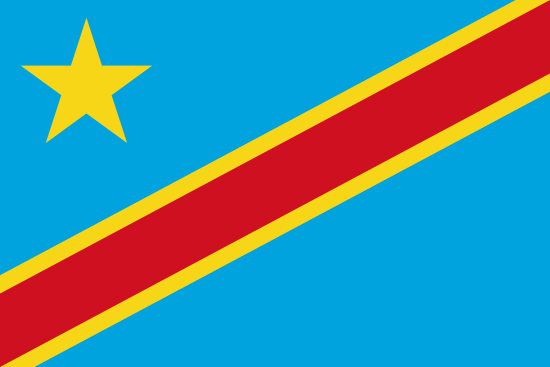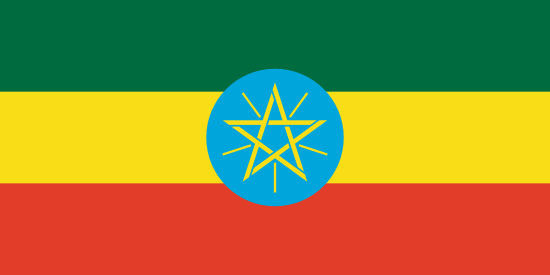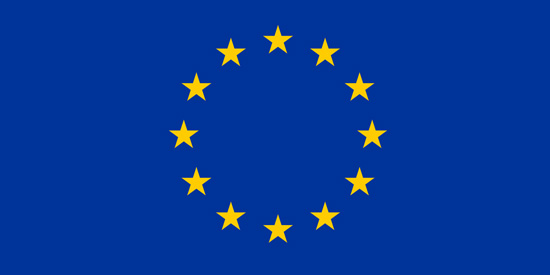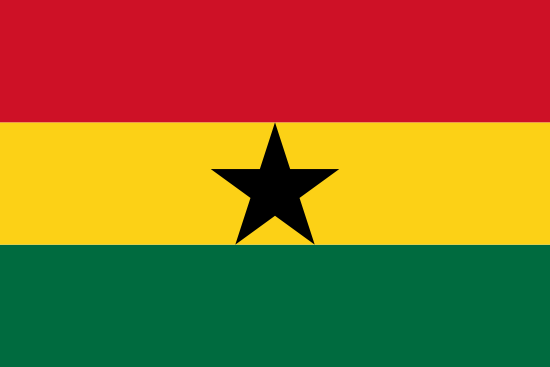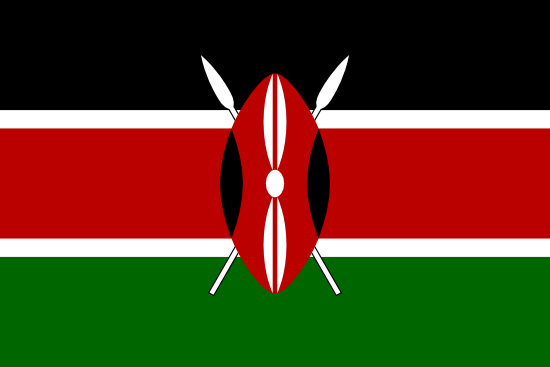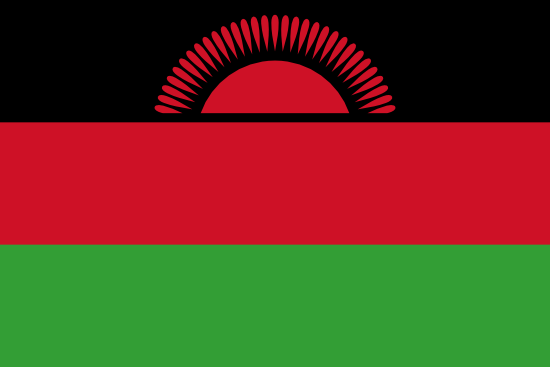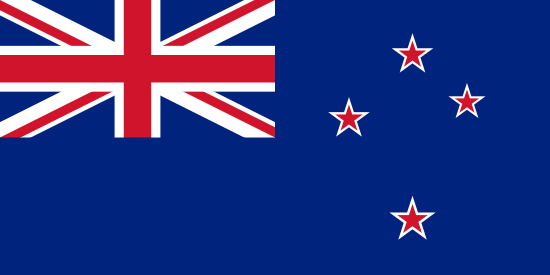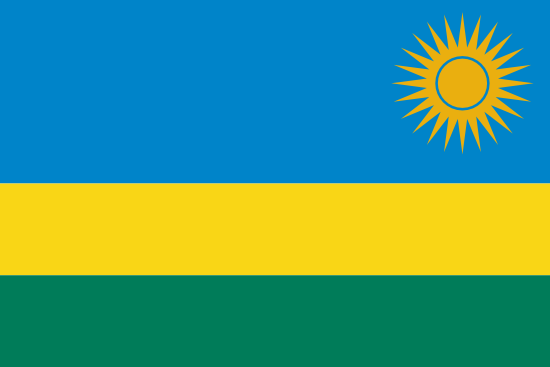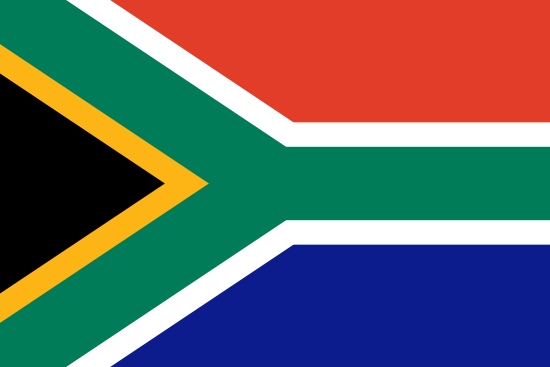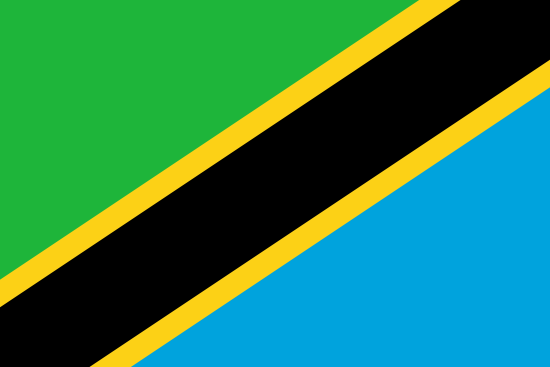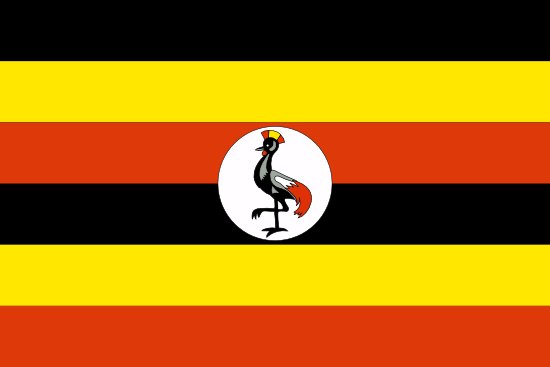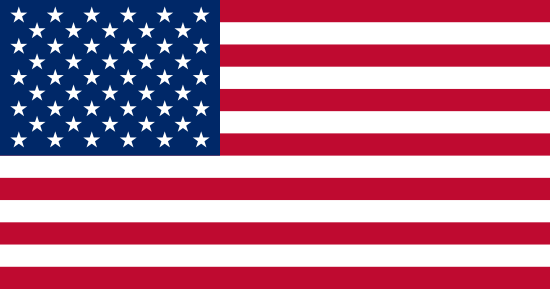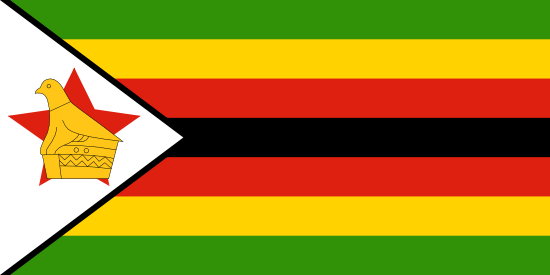We are so excited to share an update with you about our Pastors Training Course (PTC) that is currently running in Kenya. It is such a privilege to partner with you in this ministry. You are helping empower students to influence the transformation of the church in Africa.
Alice Auma is a young teenager from Nairobi, who recently completed her PTC. She loved learning about the Old and New Testament, and the process allowed her to reflect deeply on how the laws of the Bible could be applied to her own life.
The lessons from the Old Testament stories of the Israelites being rescued from Egypt helped strengthen Alice’s faith to wait on God’s perfect timing. The New Testament helped her to understand the ultimate sacrifice Jesus made for all of us in dying on the cross for our sins.
“I have learnt how to spread the gospel to people of all different backgrounds,” says Alice. “And I also know how to interpret scripture and to distinguish between true and false prophets. I have really benefited from this course, and I thank Almighty God for allowing me to participate. It has changed me as a person.”
Jeff Wafula is a student at Mt Kenya University, and says that completing his PTC was the best thing that happened to him in 2021. The course content and teachings have transformed his life.
Going through the Bible so thoroughly has helped Jeff to equip himself with knowledge and a better understanding of Biblical principles. It shaped the way he viewed the scriptures, and brought him into a closer relationship with God.
“Since doing PTC, I can handle many different situations and people,” Jeff says. “Through the Bible teachings, I have understood the word better, and am able to share with people whenever I get the chance.”
AE is looking forward to teaching more PTC courses, and equipping students just like Alice and Jeff to become church leaders and proclaim the good news of the Gospel throughout Africa.
Climate change is having a growing impact on the African continent, hitting the most vulnerable hardest, and contributing to food insecurity, population displacement and stress on water resources, according to the “State of the Climate 2020” report by the World Meteorological Organisation (WMO). At AE we have reported on the impact of locust plagues in Ethiopia and devastating floods and their impact on those we reach out to.
Within the urban slum areas which form a part of our outreach areas in Kenya, Uganda and other Sub-Saharan areas, choked gutters and drains transfers bacteria, viruses and parasites that lead to disproportionately high levels of child mortality and illness. The impact overflows into significant social issues impacting education, work, rates of depression, suicide and unrest.
With your support, AE continues to build drainage systems, latrines, sanitation equipment and information to help kids into schools, reduce illness and create a way forward for better conditions and social opportunity. In partnership with the church, we demonstrate the love of Christ through practical measures that help transform the physical and spiritual well being of populations vulnerable to catastrophic climate events.
Since the inception of our work in Kibera and Korogocho slums in Nairobi, African Enterprise Kenya has progressively worked with slum residents and relevant local government officials, schools and community groups to improve hygiene and sanitation conditions in these areas. We give thanks to all those who continue to participate in the urgent work of protecting these communities and giving new generations a chance to live free of poverty, disease and in the love of Christ.
For every adverse weather event, the situation for slum communities deteriorates, however with your prayers and support, we will save lives and build safer healthier communities in the name of Jesus. For more information or to support AE’s work to combat the effects of severe climate conditions, please visit our website or contact our office.
The Mombasa West Mission in Kenya is the first one to be conducted in the year 2021. The mission is scheduled for 1st to 11th July. The mobilization of missioners and preservation facilitators took place in the month of May. The AEE Kenya team intends to host 300 visiting missioners in 9 zones. The rest of the missioners will come from within Mombasa. This month, there has been a series of continued mobilization and trainings.
The Kayonza Mission in Rwanda was scheduled for 20th – 27th June but following the Volcanic eruption in the neighboring DRC, the mission was postponed to 15th – 22nd August. Preparations for the same are ongoing. At least 127 homes are targeted to be trained to conduct Home Based Evangelism (HBE). Though this is an ongoing activity, 42 households were reached in May this year using HBE and 9 people accepted to follow Christ.
In the Democratic Republic of Congo (DRC), preparations for the Mont-Amba Mission, which is set for 16th to 24th October, are ongoing. Mont-Amba is located South East Kinshasa in DRC. AE DRC Team conducted School of evangelism in the targeted location of the Matete, Ngaba, Kisenso and Lemba districts and a total of 276 participants from 99 local churches were trained. Currently, the team is mobilizing for prayer and funds for the mission. Earlier, 19 different local churches were equipped for further church members’ mobilization in the target area.
AEE Tanzania is set to have its mission between 22nd and 29th August in the capital city, Dar es Salaam. The team has been meeting the Pastors, equipping them through trainings towards the mission and conducting prayer for the 2021 Mission. Mobilization of evangelists and partners to participate in Dar Back-to-God Mission has as well been ongoing. In the month of May, a group of intercessors from different Churches gathered to purposely pray for the mission preparation and all programs at AEE-Tanzania.
In September, AE Uganda will have a mission in Jinja from 19th to 26th. The AE Team conducted a Vision Casting seminar for the mission where 52 leaders from Jinja City attended. This meeting brought together both the Anglican church leaders and Pentecostal church leaders in one house for the same purpose bridging the gap and dealing with misunderstandings that have always been there. Mobilization teams have been established and tasked to draft their strategies to aid achieving the mission targets. An overall steering committee with 18 members was constituted in May to help oversee the preparations. AE Uganda facilitated a training held in Entebbe for 120 evangelists by our partners in ministry who are planning a citywide mission in that city. The training was organized by the Joint Pastors Network in Entebbe city.
AE Southern Africa Region (AESAR) which is comprised of the Malawi, Zambia and Zimbabwe teams is set to hold a mission from 19th – 25th September in Zomba, Malawi. AE Malawi held three training sessions in Zomba ahead of the mission where 85 people were trained. The second phase of training the same group was set for the month of June. In April this year, task team leaders for the Zomba Leadership Mission were successfully appointed and a meeting with Church leaders in Zomba to review mission plans was held.
The AE Zambia team continues to go through the AE Manuals to adequately prepare for both the Kitwe and Lusaka mission scheduled for this year and next year respectively. The AE Zambia team visited Kitwe at the invitation of the Maranatha Pentecostal Assemblies of God church to help with the mobilization of the church for evangelism. Close to about 100 church members turned out for the evangelism outreach in Kalulushi.
In Ghana, the AE team is preparing to have a mission in Lome, Togo from the 15th to the 25th of October. An online meeting with the leaders in Togo was held earlier to aid preparations. The leaders were also able to meet the working committees in person. A HBE online training is scheduled for 30th June.
Preparation is ongoing for AE Ethiopia’s mission scheduled for 22nd – 26th December in Kotebe, North East of Addis Ababa. Last month, the AE team held a Home Based Evangelism training as part of the preparations steps for the mission.
AE’s Soweto Kayole Clinic continues to offer essential primary healthcare services to those who need them most.
Early in 2020, many primary health facilities in Nairobi were closed due to the fear of Covid-19, as well as low patient numbers. However, Soweto Kayole remained open to provide essential primary healthcare services to residents of the surrounding slums.
Soweto Kayole Clinic offers affordable and reliable pregnancy services. The antenatal care offered by the clinic includes voluntary counselling and testing (VCT) services for HIV, and the prevention of mother-to child transmission of the disease.
The Clinic also provides HIV counselling, testing and anti-retroviral treatment for residents of the surrounding slums. HIV patients receive comprehensive care that includes anti-retroviral drugs and other medications, nutrition parcels, psychological support and ongoing medical follow-up.
In addition, Soweto Kayole tests and treats patients for tuberculosis, which is very prevalent in the region. During a recent TB campaign, 652 patients were tested for tuberculosis, and 251 tested positive. These patients are receiving TB treatment free of charge at the clinic.
Soweto Kayole clinic also manages emergencies and trauma cases. With an ambulance donated by AE supporters, the clinic is able to refer those with more serious injuries to major hospital centres.
The clinic continues to offer immunisations and growth monitoring of babies and children, as well as education of mothers in the community.
Following the lifting of government Covid-restrictions, clinic staff and volunteers have resumed various health promotion initiatives. Recent initiatives have focused on hygiene and the prevention of infectious diseases.
The Clinic has also recently started a Community Transformation group comprised of local health volunteers. The volunteers have recently received training in trauma healing, and are assisting with trauma counselling and psychosocial support for clinic patients. The group also aims to initiate income-generating activities in the near future.
My name is Elizabeth Wanjiku, I am a single parent of 5 children and a grandmother of 13 children. I live in Korogocho slums in Nairobi where I have lived for over 20 years now. I raised all my children here in Korogocho but unfortunately 3 of them got sick and passed on. Life in Korogocho is not easy and we only live here because we are unable to afford living in a better place. Due to lack of jobs many young people are idle and engage in criminal activities, drug abuse and other things to try to survive the hard life here.
Most of my time I scavenge at the local dumpsite where I collect sacks plastic containers etc. and clean them for resale at a local market. My grandchildren and I live in a small house and since most of them are orphaned I have to provide for them and I keep praying for God to help me as I am now old and sickly. Despite all these challenges our community is full of joy, most of the times you will find children happily playing in the streets.
God has used AEK to help me and my neighbors for many years; they have built good toilets in our community and since last year they have been providing us with food and soap since most of us are no longer able to earn anything due to Covid-19.
Please pray for the health, wellbeing and jobs of displaced and marginalised people in informal settlements, and for the government to care and provide assistance to these communities.
Ugali – Kenya
Servings: 3-4
Ingredients:
4 cups water
3 cups full of maize, millet, or sorghum flour (can be mixed with cassava flour).
Preparation: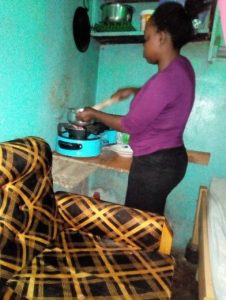
- Bring the water to a boil in a large pot, and then pour in some of the maize flour.
- Allow the water to keep boiling for a few minutes, and then begin to turn the mixture with a wooden spoon. Sprinkle in more flour and continue mixing. The mixture should start to thicken as you keep stirring and adding more flour.
- Hold the pot with a cloth to prevent burning your hands, the ugali will become firmer and more solid.
- Press the ugali against the wall of the pot with the spoon, and then mix it back into the pot to ensure it is well cooked.
- Repeat this process several times. Let the ugali stay in the middle of the pot, and turn down the heat to low. After a few minutes, press out until well cooked.
- Remove it from the heat.
- Scoop the ugali onto a plate, and cover the plate with the pot for a few minutes as you dip the spoon into some water. Serve with meat, chicken, fish, or vegetables on the side.
Fufu with soup – Ghana
Ingredients used (Light soup)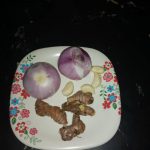
1. Tomatoes
2. Onion
3. Garden eggs
4. Pepper
5. Tomato puree
6. Tilapia (any fish or meat of your choice)
Method
1. Put a cooking pot with the tilapia on fire.
2. Blend onion, garlic, ginger and pepper and pour the mixture in the pot to spice the fish. Cook for about 10 minutes.
3. Put fresh tomatoes into the whole mixture. Add your tomato puree of a desired texture and consistency. Meanwhile, put the garden eggs on fire to boil.
4. Cook for about 10 minutes. Blend the cooked garden eggs and sieve into the soup. Allow the mixture to cook for 15 to 20 minutes. Remove the fresh tomatoes from the soup and blend. Pour the blended tomatoes into the soup.
5. Finally, wait for about 10 minutes for the soup to simmer under low heat.
Ingredients (Fufu)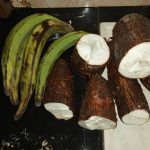
1. Cassava
2. Plantain
Method
1. Peel the cassava and plantain
2. Boil until well cooked or soft
3. Sieve the water from the cooked cassava and plantain
4. Set up the mortar and pestle for pounding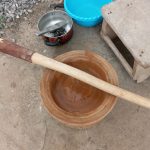
5. First, pound and stir the plantain simultaneously until a smooth consistent mixture is formed
6. Pound and stir cassava too until a smooth and starchy mixture is obtain
7. Pond and stir the plantain and cassava together to obtain a uniform mixture of both the cassava and plantain. The mixture formed is golden brown in colour
8. Dish out the fufu into a bowl and serve with the soup
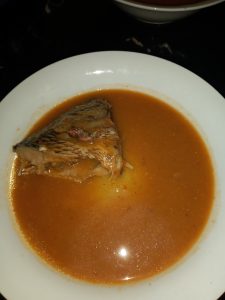
Please pray for the many families across Africa who are not able to place meals on the table each night. Pray for our sustainable crops projects to yield fruit so that more and more families can plant and harvest their own crops, providing food not only for them but also sharing with their neighbours and friends.


